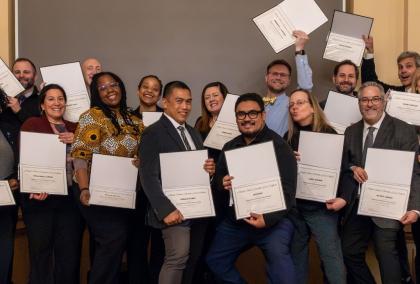

Keeping the Fulbright Finland Foundation Updated
Remember to notify the Fulbright Finland Foundation in case you are
- traveling outside Finland
- moving or your contact information changes
- offered an honorarium or other salary during your grant period. Please note that Fulbright U.S. Student grantees need prior approval from the Fulbright Finland Foundation before accepting a job offer.
Please also keep your program coordinator updated if you have any problems or questions during your stay in Finland. When you are in contact with IIE/IREX, remember to copy (CC) your program coordinator in the email.
Traveling During Your Fulbright Term
Principles:
- The grant has been awarded for your grant term in Finland.
- The grant has been awarded for full-time study/research/lecturing/professional development project or for a combination of these activities.
- The grantee cannot travel during compulsory Fulbright Finland Foundation events and other engagements.
- The grantee must obtain prior approval from the Foundation for all travels abroad. NB! Fulbright DA program participants will also need to consult IREX before any travel out of the country.
TRAVEL REQUEST FORM
At least 2 weeks before traveling abroad, submit your travel details to the Foundation by filling in the travel request form!
How much can I travel abroad?
Grantees are permitted a cumulative total of 14 days of personal travel outside Finland. Weekends and local national and/or religious holidays are not counted towards the 14-day traveling abroad limit.
In addition, days over the Finnish Christmas holidays, December 24 to January 6 (when the host institution has no classes, examinations, or other academic activities) are not counted towards the 14-day traveling abroad limit for those staying in Finland for at least one full academic year (9 months).
However, please keep in mind that your grant has been awarded to you for the purpose of academic and cultural exchange in Finland. Therefore, your full-time study/research/lecturing/professional development project conducted in Finland should always be the absolute main focus of your grant term.
According to the IIE Terms and Conditions, “grantees are permitted a cumulative total of 14 days of personal travel within and outside of the host country, excluding weekends, national and/or religious holidays in the host country, and depending on the host country policies. The Fulbright Commission in the host country may permit more than 14 days of personal travel. The grantee must obtain prior approval for all personal travel from the Fulbright Commission, which may consult with ECA before granting approval”.
Traveling within Finland
The Fulbright Finland Foundation has made a decision not to count travels within Finland to 14 days of personal travel. Besides engaging in the full-time Fulbright project in Finland, the Foundation encourages grantees to explore the country and visit different locations in order to learn comprehensively about Finland and its culture.
Do this before traveling abroad:
- Before making plans to travel outside of Finland, talk to your host and make sure that the timing of your travel is suitable for your host and that the travel does not negatively impact your Fulbright project.
- At least two weeks before traveling abroad, submit your travel request to the Foundation or inform your Fulbright Finland Foundation program coordinator the following details of your travel to find out whether the travel can be considered Fulbright project-related and whether the travel has any effect on your grant:
- destination country and city,
- purpose of the travel (leisure/Fulbright project-related), if project related, please explain further how the travel is related to your Fulbright project (giving a presentation about the Fulbright project, meeting with project collaborators, or conducting fieldwork for the Fulbright project etc.),
- website of the event and/or program of the event you are visiting abroad if applicable
- exact travel dates,
- information about your discussion with your host on the suitability of your travel dates,
- how can the Foundation reach you during the travel? what is your contact information while traveling? (the Foundation is required by the U.S. Department of State to be aware of grantees’ whereabouts and the Foundation must also be able to contact grantees in case of an emergency).
According to the IIE Terms and Conditions "the grantee must obtain prior approval for all travel from the Fulbright Commission, which may consult with ECA before granting approval". Fulbright DA program participants will additionally need to consult IREX before any travel out of the country.
The U.S. Department of State decides whether the travel can be considered Fulbright project-related with a valid ASPE benefit. In non-Fulbright project-related travels, the ASPE benefit will not be valid and you must make sure that your own health and travel insurance is valid during the travel.
Be sure to also check the entry such as the visa requirements of the destination country.
Travel in European countries
U.S. citizens can travel to most European countries as tourists for usually a maximum of 3 months, based on European Union regulations or the Schengen Convention. Please note that the European Union and the Schengen area are two different zones and include different countries. Before planning to travel to other European countries, always check the travel regulations for U.S. citizens with the country’s immigration officials. Do take your passport and residence permit along when traveling inside the Schengen or EU areas.


